What you need to know about COVID-19 in Europe right now
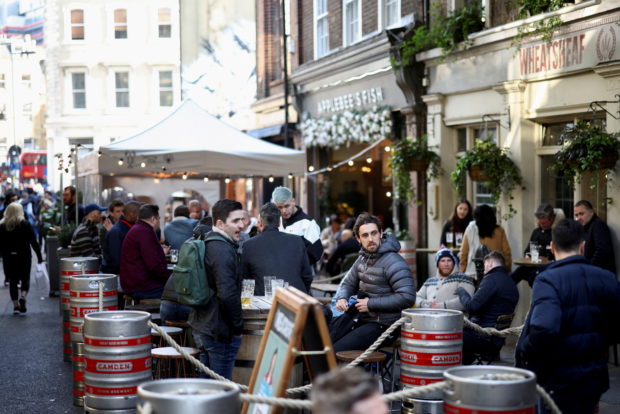
People drink at the terrace of a bar, as the coronavirus disease (COVID-19) restrictions ease, in London, Britain, April 16, 2021. REUTERS FILE PHOTO
Europe has become the epicenter of the pandemic again, prompting some governments to re-impose unpopular lockdowns in the run-up to Christmas and stirring debate over whether vaccines alone are enough to tame COVID-19.
Europe accounts for more than half of the average 7-day infections globally and about half of latest deaths, according to a Reuters tally, the highest levels since April last year when the virus was at its initial peak in Italy.
Here’s what’s you need to know about coronavirus in the European continent right now:
Germany
Germans were warned Monday they would be “vaccinated, cured or dead” from Covid-19 by the end of winter, as Europe battles an upsurge in the pandemic that prompted a US travel advisory.
The stark warning comes as Germany is racing to contain a record rise in coronavirus infections in recent weeks, with hospitals sounding the alarm about overflowing intensive care units.
Article continues after this advertisementDespite widespread access to free coronavirus vaccines, just 68 percent of the German population is fully vaccinated, a level experts say is too low to keep the pandemic under control.
Article continues after this advertisementSlovakia
Slovakia on Monday introduced restrictions for people unvaccinated against Covid-19, the health ministry said, as the central European country battles one of the world’s highest coronavirus infection rates.
Unvaccinated people are not allowed to enter stores other than those considered essential, such as grocery stores, drugstores or pharmacies — even with a negative coronavirus test.
READ: Slovak COVID-19 patients arrive in Poland
Czech Republic
The Czech government last week announced it would introduce new measures to encourage Covid 19 vaccinations after a fresh record in daily infections.
Starting Monday, only the vaccinated and those who have had Covid in the last six months will be allowed access to bars, restaurants, hotels and other services. A negative Covid test result will no longer suffice.
Health Minister Adam Vojtech explained that “the main goal of these measures is to motivate people to get vaccinated.”
Austria
Ahead of the Christmas holidays, Austria shut its shops, restaurants and festive markets Monday, returning to lockdown in the most dramatic Covid-19 restriction seen in Western Europe for months.
The decision has prompted a fierce backlash, with tens of thousands taking to the streets, some blaming the government for not doing more to avert the latest coronavirus wave crashing into Europe.
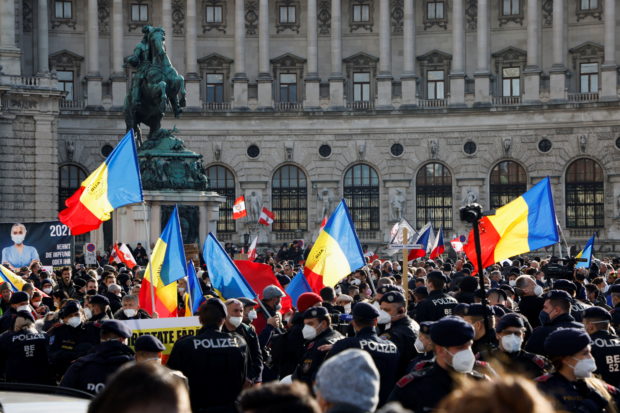
Demonstrators gather to protest against the coronavirus disease (COVID-19) measures in Vienna, Austria, November 20, 2021. REUTERS
By Monday morning, Austria’s 8.9 million people were not allowed to leave home except to go to work, shop for essentials and exercise.
The Alpine nation is also imposing a sweeping vaccine mandate from February 1 — joining the Vatican as the only places in Europe with such a requirement.
Hungary
People were lining up for COVID-19 shots outside Budapest’s main hospitals on Monday as Hungary for the first time offered vaccinations without prior registration amid a surge in new infections.
Hungary reported a record high tally of 11,289 new cases on Friday and on Monday reported 27,209 new cases for Friday to Sunday and 392 deaths.
Hungary, with a population of 10 million, has reported 33,172 coronavirus deaths in total.
Despite people lining up for shots, Hungary‘s vaccination rate lags the EU average, with about 5.8 million people having had the two shots.
The government imposed mandatory mask wearing in closed spaces last week and said it would make COVID shots mandatory for all healthcare workers.
United Kingdom
Britain will review its COVID travel rules in January and is looking at reforming its airport slots system as part of a wider new aviation strategy, minister Robert Courts said on Monday.
Britain has lagged other European countries in lifting pandemic travel restrictions with airlines complaining that the need for day-2 coronavirus tests and complicated passenger locator forms have deterred people from traveling to and from the United Kingdom.
READ: UK gov’t under spotlight as COVID-19 cases rise again
Russia
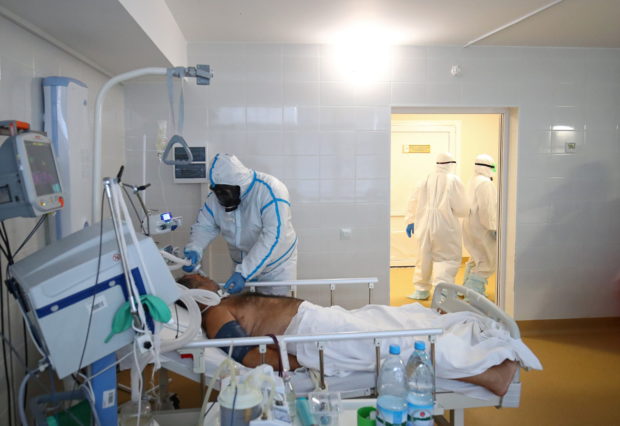
A medical specialist wearing protective gear tends to a patient at the Intensive Care Unit (ICU) of the City Clinical Hospital Number 1, where people suffering from the coronavirus disease (COVID-19) are treated, in Volzhsky, Russia October 25, 2021. REUTERS FILE PHOTO
Russia on Friday reported 1,254 coronavirus-related deaths in the last 24 hours, a record daily high that follows a surge in cases.
The government coronavirus task force also reported 37,156 nationwide infections, including 3,371 in Moscow, down from a peak of 41,335 recorded on Nov. 6.
READ: Russia’s daily COVID-19 deaths hit new record high
Spain
Spain will provide Covid booster shots for those aged 60 and over as well as health staff, Prime Minister Pedro Sanchez said Wednesday as infections numbers rise.
During an official visit to Turkey, Sanchez said the key to fighting the pandemic is to “continue this successful vaccination strategy in our country”.
The Spanish leader did not say when the third vaccine doses would start to be given.
READ: How Spain took the lead on vaccinations against COVID-19
Netherlands
Riots broke out in cities across the Netherlands on Sunday, the third night in a row that police clashed with mobs of angry youths who set fires and threw rocks to protest COVID-19 restrictions.
The latest unrest began on Friday night in Rotterdam, where police opened fire on a crowd that had swelled to hundreds during a protest that the city’s mayor said had turned into “an orgy of violence”.
The protests were sparked by opposition to government plans to restrict use of a national corona pass to people who have either recovered from COVID-19 or have been vaccinated, excluding those with a negative test result.
The Netherlands reimposed some lockdown measures on its 17.5 million population last weekend for an initial three weeks in an effort to slow a resurgence of the virus, but daily infections have remained at their highest levels since the start of the pandemic.
France
French health authorities reported 5,266 daily new COVID-19 infections on Monday, pushing the seven-day moving average of new cases to an almost three-month high.
French government spokesperson Gabriel Attal said on Sunday the current wave of the pandemic was “rampant.”
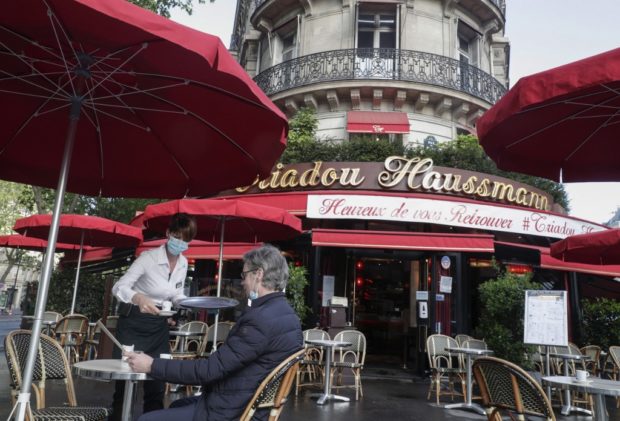
A member of staff serves a customer at a cafe in Paris on May 19, 2021, as cafes, restaurants and other businesses re-opened after closures during the coronavirus (Covid-19) pandemic. AFP FILE PHOTO
Unlike some of its European peers, France has yet to announce a new batch of restrictive measure to contain the disease, with some experts saying the ongoing wave could hit its climax in the country around Christmas.
Belgium
Violence broke out at a protest against anti-Covid measures in Brussels on Sunday, in which police said tens of thousands of people took part.
The march began peacefully but police later fired water cannon and tear gas in response to protesters throwing projectiles, an AFP photographer witnessed.
Belgium, one of the countries hit the hardest by the latest wave, last week expanded its work-from-home rules and strengthened curbs targeting the unvaccinated.
With an average of nearly 10,300 new infections per day over the past week, Belgium is back to a rate of spread of the virus that has not been seen for a year.
Greece
Thousands of Greek restaurant owners last week shut their businesses in a nationwide one-day protest against restrictions and tougher fines aimed at increasing the vaccination rate.
They object to recent measures making establishments responsible for checking the vaccination or test status of customers.
Coronavirus cases in Greece are at the highest level since the start of the pandemic, with the daily infection rate hovering around 7,000 for much of the past week.
Out of a population of 10.7 million, fewer than 6.5 million in Greece are fully vaccinated.
READ: Unvaccinated in Greece face new restrictions as COVID-19 cases soar
Portugal
Portuguese Prime Minister Antonio Costa said on Tuesday that authorities in one of the world’s most vaccinated nations may bring back some measures to stop the spread of COVID-19 in the run-up to the holiday season as infections soar across Europe.
Around 86% of Portugal‘s population of just over 10 million is fully vaccinated against COVID-19. It has reported around 1.1 million cases and 18,265 deaths since the pandemic began.
The country faced its toughest battle against COVID-19 in January, forcing authorities to impose strict lockdown measures, that have since been lifted.
Mask-wearing is still required in public transport, shopping malls and large gatherings. The EU digital COVID-19 certificate is required to enter nightclubs and big events, as well as to travel.
Italy
Ski resorts in northern Italy are reopening for the winter season after prolonged shutdowns due to the COVID-19 pandemic, although a recent rise in infections is spreading worries over possible new restrictions.
Italy has seen a rise in daily cases in recent weeks, especially in some northern areas where many ski slopes are located. Hospitalizations remain under control nationwide but operators are aware of the risks rising infections may pose.
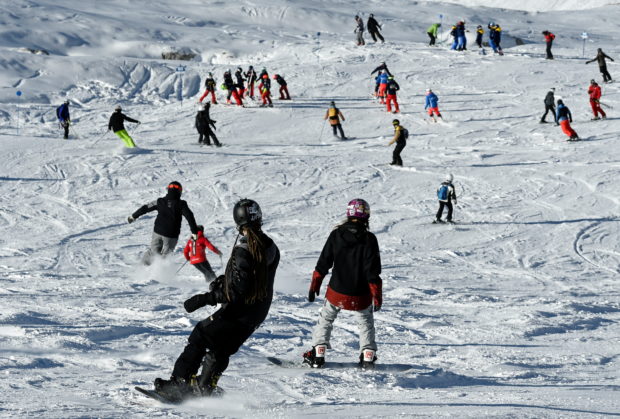
People ski as resorts reopen for winter despite the fear over a rise in coronavirus disease (COVID-19) infections, in Madonna di Campiglio, northern Italy, November 20, 2021. REUTERS
A COVID-19 health pass – which shows if someone has completed the vaccination cycle, has recently tested negative or recovered from the disease – is required to access ski lifts along with face masks and social distancing rules.
Sweden
The Swedish government plans to introduce a requirement for COVID-19 vaccine passes at indoor events where more than 100 people attend, a step recommended by health officials warning of a rising tide of infections in coming weeks.
Around 85 percent of all Swedes over 16 have received one dose vaccine and 82 percent have had two doses or more.
Sweden currently has the lowest number of COVID-19 patients in hospital and in intensive care in the European Union, relative to the size of the population, according to OurWorldinData, but has been hit hard by earlier waves.
Sweden has opted against lockdowns and relied mostly on voluntary measures aimed at social distancing. It has seen several times higher deaths per capita than its Nordic neighbors but lower than most European countries that opted for strict lockdowns.
READ: Sweden spared surge of virus cases but many questions remain
For more news about the novel coronavirus click here.
What you need to know about Coronavirus.
For more information on COVID-19, call the DOH Hotline: (02) 86517800 local 1149/1150.
The Inquirer Foundation supports our healthcare frontliners and is still accepting cash donations to be deposited at Banco de Oro (BDO) current account #007960018860 or donate through PayMaya using this link.